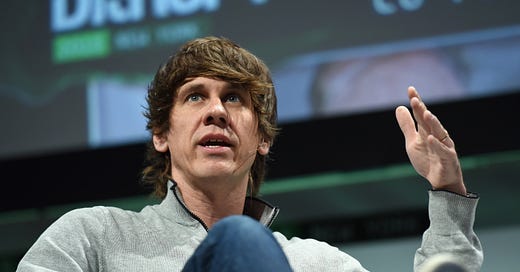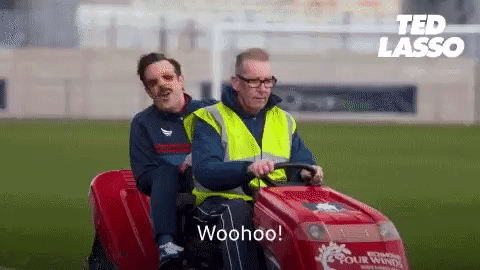Did Foursquare’s Co-Founder Disrupt Lower-League Soccer?
When Dennis Crowley started the Kingston Stockade, he hoped to help fix soccer’s landscape. After five seasons, I caught up with him to find out how it's gone.
Nobody would have blamed Dennis Crowley for picking a less daunting hobby. But back in 2015, the long-time tech luminary decided that he’d sooner start a fourth-tier soccer team from scratch in Kingston, NY, the Hudson Valley town where he spent a lot of weekends with his family. He had this notion that by beginning a club, putting his startup savvy and business network to use, he could help develop a blueprint for others to follow.
Because Crowley believed that for the United States to improve as a soccer country—on the men’s side anyway—what it needed was more soccer. And in order to do that, somebody had to create a model and show just how to build a sustainable soccer club in the lower tiers of the minor leagues. To his point, the American game was badly lacking in infrastructure that could connect the youth game, the college game and the semi-pro and professional tiers. The sport needed more pipelines for talented players to trickle into the game.
Stockade FC began play in 2016 in the semi-professional National Premier Soccer League, although it has never yet paid anyone in order to protect the eligibility of its college players. Crowley built the club from the ground up by washing jerseys, selling merch from behind a folding table, distributing pocket schedules at local businesses and recruiting a team of volunteers to help him. He also forged an international brand. The club stood for something, tapping into a desire to create a more meritocratic American game, with upward mobility dictated by performance, rather than the depth of your owners’ pockets. Before long, the Stockade was selling jerseys and t-shirts all over the world. I wrote about the club a few times along the way .
All the while, Crowley published open-source guides to what he was doing, providing manuals to others and sharing his finances in granular detail.
In July, the Stockade finished its fifth season—having lost the entire 2020 campaign to COVID-19. Last week, when Crowley had a little free time after the birth of his third child, I caught up with him to assess how his project is going. Here is our conversation, edited for clarity and length:
Soccer Stories: Congratulations. At the lower levels of American soccer, it’s a feat to survive for 5 seasons at all. How do you feel about that?
Dennis Crowley: I can’t remember who, but someone did an analysis that showed that most lower-league clubs go out of business in something like the first three seasons. We have a pretty good, sustainable model with Stockade. We were pretty transparent and vocal in the beginning: there’s no point in doing this if you’re going to lose tens of thousands of dollars every year. So let’s get it to the point where it’s break-even or better. This is a way that we can do the club forever.
Does the club break even now?
This past year I don’t think we missed it by that much. I can already anticipate that next season it will be a little trickier because I have to buy new jerseys. One of the things we realized after year 2 or 3 is there’s a few big-ticket items and if you can reuse them, that’ sometimes the difference between break-even and not. I know next year we have to replace a lot of equipment. But we’re fine with that.
Is the team at a point where it could continue without you, where you’re not the driving engine behind it?
I go by the chairman title but I’m really the chief organizer. I book the practice facilities; I pay the bills; I order the stuff; I fold the t-shirts—I don’t do all the jobs, but I do a lot of the jobs. Sometimes I take the laundry home. And then we have a lot of people who come on gameday and help out. Sometimes I get to watch the games, which is really nice. My work is done pre-season and post-season and in between games. Even just this morning I was thinking, ‘Gosh, I should really hire a GM that could take over half of what I do.’ I’m gonna need to do that because we just had a third baby. Three babies is a lot of babies—that’s so many babies. Going for a run is a luxury now, never mind having six hours to fold t-shirts in my garage.
When you started this club, you said that the objective was to create a blueprint for others to follow—a roadmap towards a sustainable, lower-league club on a shoestring budget. Has that happened?
One of the most positive things to come out of the Stockade experience was some of the writing that we did, that brought transparency. I would say I’ve probably talked to 50 clubs that have said, “We exist because we read your blueprint.” It might be more than that. It’s staggering and humbling. The blog post gave them the confidence to do it. I didn’t help at all except for someone read something I wrote 5 years ago and they decided to use this as a blueprint. It’s super, super meaningful. Those clubs that are out there are inspiring other clubs. This pay-it-forward thing might affect 100 clubs. It’s pretty wild. I’m like, holy cow, it worked.
So in 5 years, what have you learned?
I’ve learned there’s a lot of politics in the soccer landscape, a lot of ego and entitlement. There’s a lot of opportunity. But then there’s also these pitfalls. One of the things I wrestle with a lot is on its best day, Stockade got 1,400 fans to show up for its home game—that’s when we won our conference championship. We’ve gotten over 1,000 fans probably six or eight times. That’s a really good feeling. But I don’t know how to get 1,500 fans. I don’t know how to get to 3,000 fans. Is this kind of the reality of lower-level soccer in smaller communities? You get to a point and you’re just kind of there? You could do a big spend and try to do a big campaign and lay the money out and try to drive all those people in. Over 2 or 3 years we could have a strategy to go to 2,000 fans. But I think that’s somebody’s full-time job and Stockade is nobody’s full-time job. By living through the experience, you realize how hard it is to do the next thing. The hardest thing to do in lower-level soccer is to go from running a short summer-season squad to doing a full season. It’s very, very challenging to take a team like ours and turn it into a professional squad.
Do you think that’s the tech guy in you, where your drive is to make things and then grow things? Could you also argue that if the Stockade has eventually inspired 200 teams that draw 1,000 fans apiece, that’s success in its own right?
Yeah, then we’ve done our job and made our tiny dent in the universe. Maybe it is the tech guy in me that wants to see us grow. What’s the point in doing the same thing we did last year and doing it again? We should be bigger. And we should be different. My daughter was born in the first season and I said when she’s 5 we’ll have a women’s team. She’s 5. And we don’t have a women’s team. I want to do that. But I don’t have the time to run two teams. I’m not comfortable with the idea of Stockade not growing. And the only way I can change that is for me to go all-in on it, which I don’t think I can do right now. Or to hire people to help do that. But that’s a totally different thing to what we do right now, which is to run an amateur, summer-league men’s club.
Do you think we’re still in a place where it would be hard to pull off a project like Stockade without the background that you brought to it? You understood funding and revenue and branding and media and all these different things that coalesced for Stockade to take off the way it did. Are the barriers to entry as high as they were 5 years ago?
I think the barriers are lower because there’s more transparency. There’s half a dozen clubs that have written their own blog posts about how much they spend and what they struggle with. There’s just a lot more of this narrative. We used to joke in the early days that you would type “How to start a soccer team from scratch” and there were no Google results. And now there’s a lot of them. It’s a thing now. There’s more people that have done it; there’s pieces you can read. It has become more accessible because there’s more information on it, more transparency around it.
Something that you talked about a lot in the beginning was that you wanted to create more routes into top-level soccer, more opportunities for young players. How do you feel you’ve done on that score, of creating a place to help players in their careers?
One constant with the Stockade is every year a guy gets tapped to play at a higher level. It happened so much we had to make an alumni page on the website to keep track of it. There’s a network now of people that know to look for Stockade players.
How have you seen the lower leagues as a whole evolve in these 5 years?
Things have evolved but things have also stayed the same. There’s still a lot of jockeying for position. I think this is the thing that is the most screwed-up in U.S. soccer: every league having big eyes about being bigger and having better status. I think the United States Soccer Federation has created kind of this toxic environment where leagues are competing with other leagues. There’s new pieces getting added to the pyramid a lot, there’s always a lot of shuffling of things. There’s still this air of uncertainty as to: do these things last? Or are they just here for a couple of seasons? But how can we create a system so there’s more of a natural staircase to climb? Because there isn’t one. As the Stockade, how do you grow? Well, we’d have to sit down and whiteboard it out: Are we in the NPSL forever? Do we go to a different league? And if so, what league is that? And just to be clear, I have no interest in leaving the NPSL. But if you just go through the thought exercise of it, there’s no clear answer. In any other league in the world, you play in this league and then if you’re good enough, you go to this league, and if you’re good enough, you go to this league. In the U.S., you’re shopping around for a different opportunity. I talk to clubs all the time and they are shopping around. It’s a problem that there’s no clear next step.
Soccer miscellany:
















Interesting read as a local soccer enthusiast and business owner in the Hudson Valley. I have personally reached out to the club on multiple occasions (different platforms) in an attempt to create a relationship. My attempts to reach out have unfortunately never been responded to. I feel they have done an excellent job at generating buzz in the area and we have clearly seen a number of other people/organizations step into the lower league game that I do not think would have if not for Stockade paving the way.